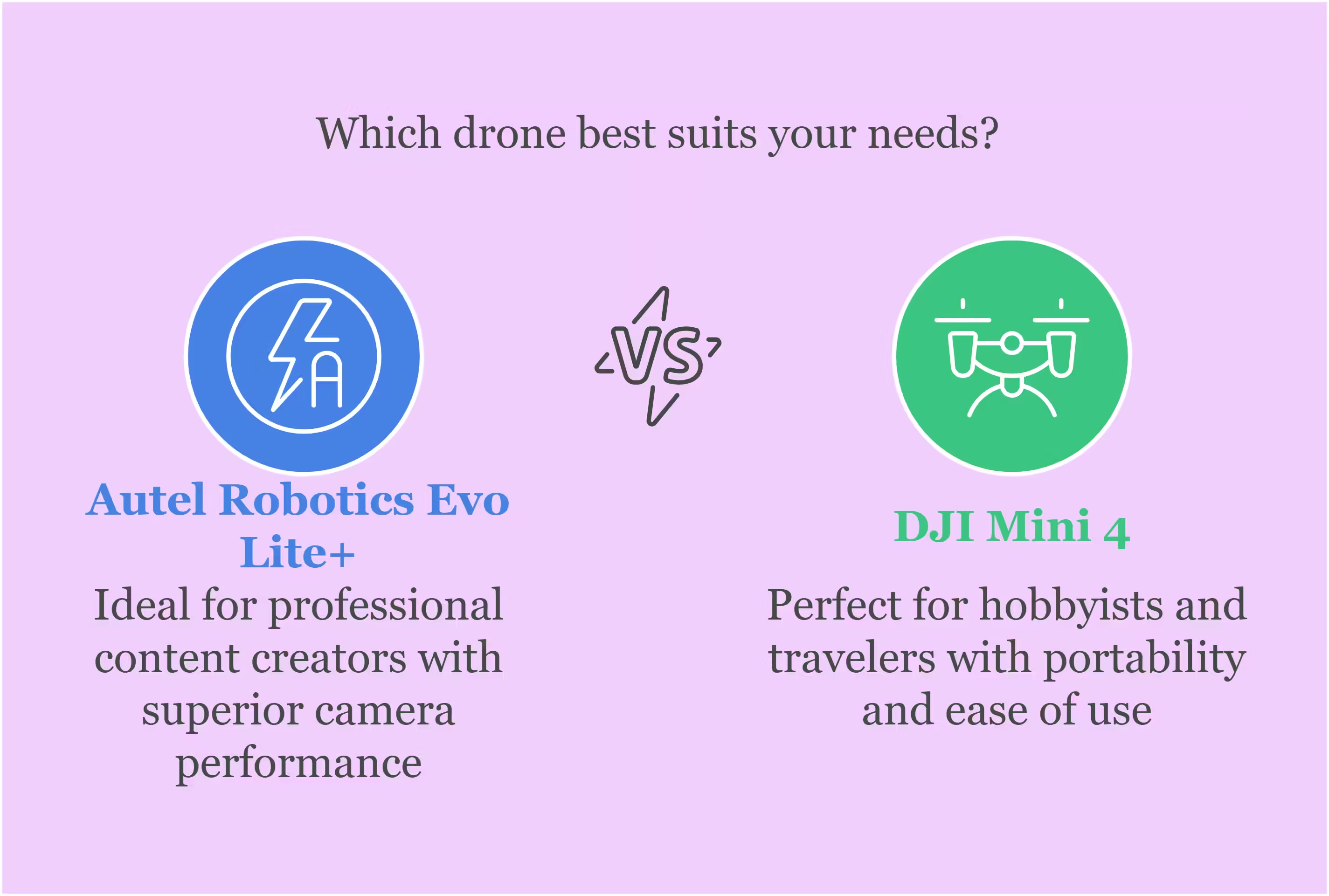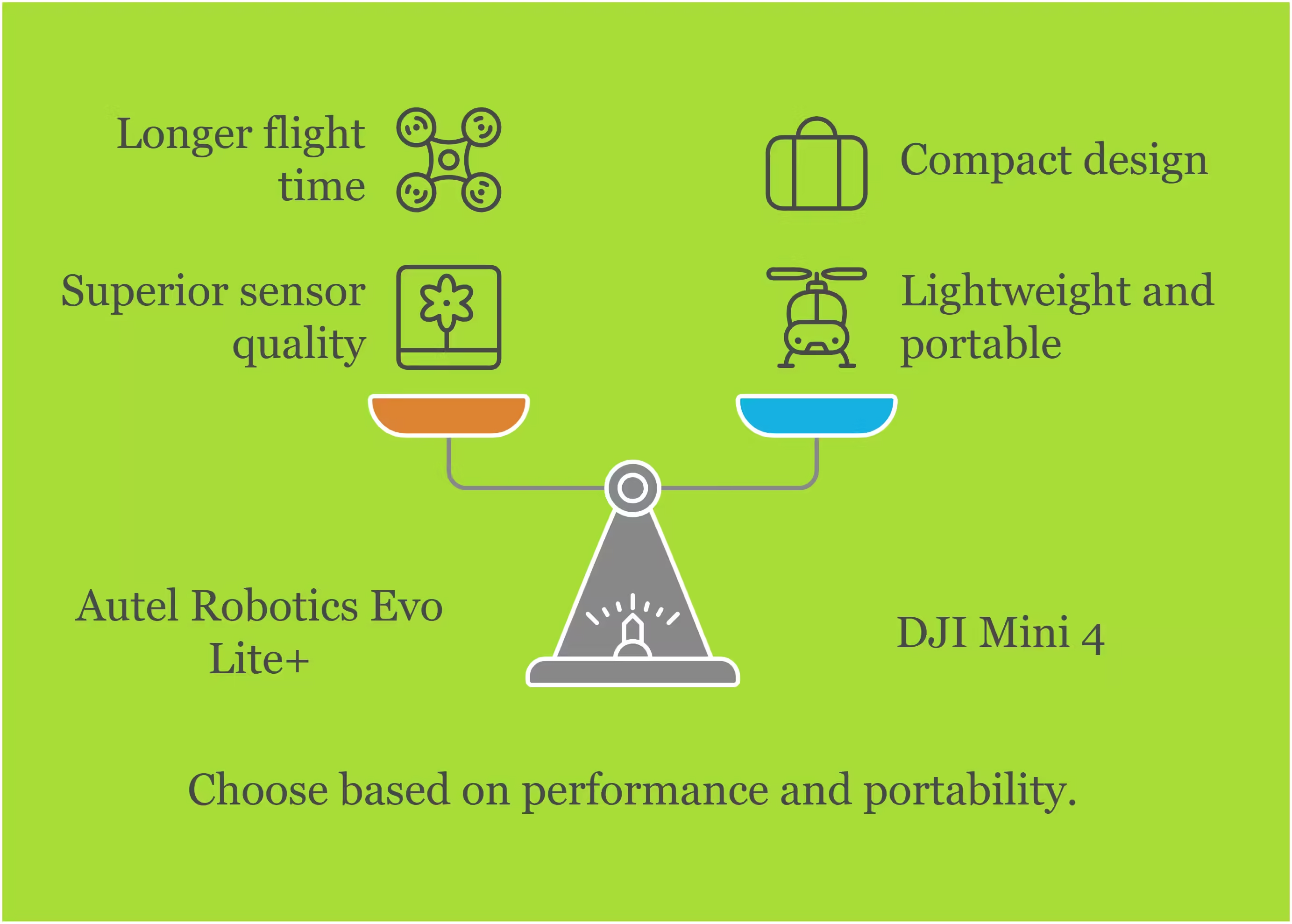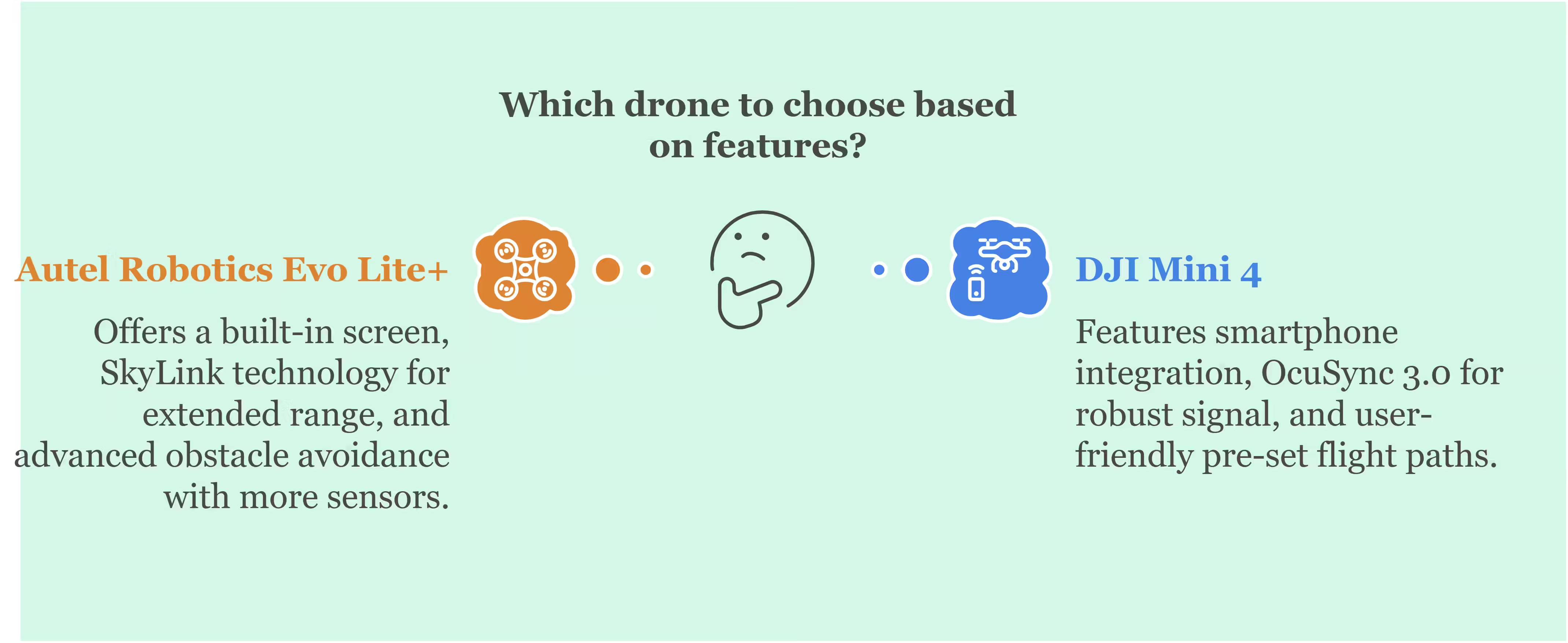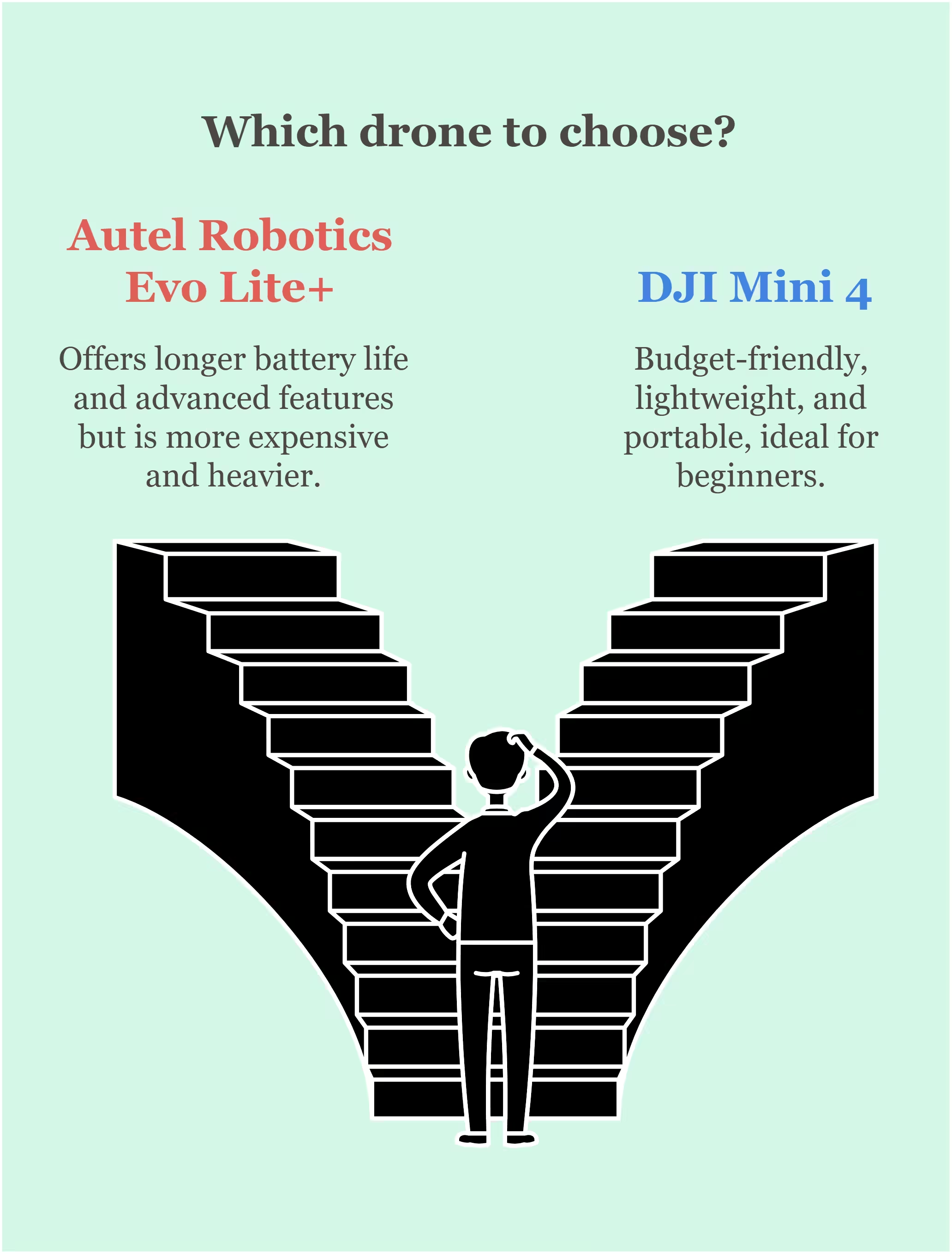The Autel Robotics Evo Lite+ offers superior camera performance, while the DJI Mini 4 excels in portability and ease of use. Both drones cater to different needs and preferences.
Drones have revolutionized aerial photography and videography. The Autel Robotics Evo Lite+ and DJI Mini 4 are two standout models. The Evo Lite+ boasts exceptional camera capabilities, making it ideal for professional content creators. It features a larger sensor and advanced imaging technology.
On the other hand, the DJI Mini 4 is perfect for hobbyists and travelers. Its compact design and user-friendly features make it incredibly convenient. Both drones have their unique strengths, catering to different audiences. Choosing between them depends on your specific requirements and usage scenarios.
Design And Build
When comparing drones, design and build are crucial factors. This section delves into the design and build of the Autel Robotics Evo Lite+ and the DJI Mini 4. We will explore their dimensions, weight, and material quality.
Dimensions And Weight
The dimensions and weight of a drone impact its portability and performance. Here’s a comparison between the Autel Robotics Evo Lite+ and the DJI Mini 4:
| Drone | Dimensions (Folded) | Dimensions (Unfolded) | Weight |
|---|---|---|---|
| Autel Robotics Evo Lite+ | 210 x 104 x 85 mm | 427 x 384 x 85 mm | 835 grams |
| DJI Mini 4 | 140 x 81 x 57 mm | 245 x 289 x 56 mm | 249 grams |
Material Quality
Material quality determines a drone’s durability and longevity. Let’s examine the materials used in both drones:
- Autel Robotics Evo Lite+
- Constructed with high-grade plastic and aluminum.
- Offers robust build quality.
- Designed to withstand minor impacts.
- DJI Mini 4
- Made from lightweight plastic materials.
- Focuses on portability and ease of use.
- Lightweight build may affect durability.
Camera Capabilities
The camera is a crucial feature of drones today. Both the Autel Robotics Evo Lite+ and DJI Mini 4 offer advanced camera capabilities. Let’s dive into the details.
Sensor Quality
The Autel Robotics Evo Lite+ features a 1-inch CMOS sensor. This sensor captures more light, delivering better low-light performance. It also supports a 50 MP resolution for still images.
On the other hand, the DJI Mini 4 has a smaller 1/2.3-inch sensor. This sensor supports a 48 MP resolution for still images. It offers decent low-light performance, but not as good as the Evo Lite+.
| Feature | Autel Robotics Evo Lite+ | DJI Mini 4 |
|---|---|---|
| Sensor Size | 1-inch | 1/2.3-inch |
| Still Image Resolution | 50 MP | 48 MP |
| Low-Light Performance | Excellent | Good |
Video Resolution
The Autel Robotics Evo Lite+ supports 6K video recording at 30 fps. This high resolution ensures crystal-clear videos. It also offers HDR video capabilities.
The DJI Mini 4, by comparison, supports 4K video recording at 30 fps. It also features HDR video, but the resolution is lower than the Evo Lite+.
| Feature | Autel Robotics Evo Lite+ | DJI Mini 4 |
|---|---|---|
| Video Resolution | 6K at 30 fps | 4K at 30 fps |
| HDR Video | Yes | Yes |
Both drones offer excellent camera capabilities. The choice depends on your specific needs. Whether you need higher resolution or better low-light performance.
Flight Performance
The flight performance of a drone is crucial for both hobbyists and professionals. This section compares the Autel Robotics Evo Lite+ and the DJI Mini 4 focusing on flight time and maximum speed. Read on to discover which drone offers better performance in the sky.
Flight Time
Flight time is key for aerial photography and surveying. The longer the drone stays in the air, the more you can achieve.
| Drone Model | Flight Time (minutes) |
|---|---|
| Autel Robotics Evo Lite+ | 40 |
| DJI Mini 4 | 31 |
The Autel Robotics Evo Lite+ offers up to 40 minutes of flight time. This is ideal for lengthy tasks. The DJI Mini 4 provides up to 31 minutes of flight time. It’s suitable for shorter flights but less optimal for extended activities.
Maximum Speed
Speed is essential for capturing fast-moving subjects and navigating large areas quickly.
| Drone Model | Maximum Speed (mph) |
|---|---|
| Autel Robotics Evo Lite+ | 42.5 |
| DJI Mini 4 | 36 |
The Autel Robotics Evo Lite+ can reach speeds up to 42.5 mph. This makes it excellent for quick maneuvers and covering large areas. The DJI Mini 4 has a maximum speed of 36 mph. It is still fast but falls short compared to the Evo Lite+.
In summary, the Autel Robotics Evo Lite+ excels in both flight time and maximum speed. The DJI Mini 4 offers decent performance but lags behind in these aspects.
Control Range
When choosing a drone, the control range is a crucial aspect to consider. It determines how far the drone can fly from its remote control. Let’s compare the control ranges of the Autel Robotics Evo Lite+ and the DJI Mini 4.
Remote Control Features
The remote controls of both drones offer unique features. The Autel Robotics Evo Lite+ remote comes with a built-in screen. This screen provides essential flight information. Additionally, it offers customizable buttons for a personalized flying experience.
On the other hand, the DJI Mini 4 remote relies on smartphone integration. It uses the DJI Fly app for real-time data and video transmission. This setup allows for an intuitive and user-friendly experience.
Signal Strength
Signal strength is vital for maintaining a stable connection between the drone and its remote. The Autel Robotics Evo Lite+ uses the SkyLink technology. This enhances the signal strength and reduces interference, ensuring a strong connection up to 12 kilometers.
The DJI Mini 4 employs OcuSync 3.0 technology. This provides robust signal strength and smooth video transmission. The control range extends up to 10 kilometers, which is impressive for a drone of its size.
| Feature | Autel Robotics Evo Lite+ | DJI Mini 4 |
|---|---|---|
| Remote Control | Built-in Screen | Smartphone Integration |
| Signal Technology | SkyLink | OcuSync 3.0 |
| Control Range | Up to 12 km | Up to 10 km |
Intelligent Flight Modes
The modern drone market is filled with smart features. Two popular models, the Autel Robotics Evo Lite+ and the DJI Mini 4, offer impressive intelligent flight modes. These modes make flying easier and safer. Let’s dive into their capabilities.
Obstacle Avoidance
Both drones come with advanced obstacle avoidance systems. These systems help prevent crashes.
| Feature | Autel Robotics Evo Lite+ | DJI Mini 4 |
|---|---|---|
| Sensors | Front, back, and bottom sensors | Front and bottom sensors |
| Detection Range | 40 meters | 30 meters |
| Flight Safety | High | Moderate |
The Autel Robotics Evo Lite+ offers a wider detection range. It also has more sensors. This makes it better at avoiding obstacles.
Automated Flight Paths
Automated flight paths simplify the flying experience. Both drones support this feature.
- Autel Robotics Evo Lite+:
- Customizable flight paths
- Follow me mode
- Waypoint navigation
- DJI Mini 4:
- Pre-set flight paths
- ActiveTrack 3.0
- Spotlight mode
The Evo Lite+ offers more customization. Pilots can set their own waypoints. The DJI Mini 4 offers easy-to-use pre-set paths. It is great for beginners.
Battery Life
Battery life is a crucial factor for drone enthusiasts. It determines how long you can keep your drone in the air. Let’s compare the battery life of the Autel Robotics Evo Lite+ and the DJI Mini 4.
Battery Capacity
The battery capacity plays a significant role in flight duration.
| Drone Model | Battery Capacity (mAh) |
|---|---|
| Autel Robotics Evo Lite+ | 6175 |
| DJI Mini 4 | 2453 |
Autel Robotics Evo Lite+ comes with a 6175 mAh battery. This provides longer flight times. The DJI Mini 4 has a 2453 mAh battery. It offers shorter flight durations compared to the Evo Lite+.
Charging Time
Charging time affects how quickly you can get back in the air.
- Autel Robotics Evo Lite+: Approximately 90 minutes
- DJI Mini 4: Approximately 60 minutes
The Autel Robotics Evo Lite+ takes around 90 minutes to charge fully. The DJI Mini 4 charges faster, taking around 60 minutes. Faster charging means quicker returns to flight sessions.
Portability
Portability is a key factor when choosing a drone. It allows you to easily carry and use the drone anywhere. In this section, we will compare the portability of the Autel Robotics Evo Lite+ and the DJI Mini 4. We will look at their foldability and ease of transport to help you decide which drone suits your needs better.
Foldability
The Autel Robotics Evo Lite+ features a foldable design. This design makes it easy to store and carry. You can fold its arms to make it more compact.
The DJI Mini 4 also offers a foldable design. Its arms fold into the body, making it very small. This feature is ideal for travelers who need to save space.
| Drone | Foldable Design |
|---|---|
| Autel Robotics Evo Lite+ | Yes |
| DJI Mini 4 | Yes |
Ease Of Transport
The Autel Robotics Evo Lite+ weighs about 820 grams. It comes with a carrying case, making it easier to transport.
The DJI Mini 4 is lighter, weighing only 249 grams. This lightweight design makes it very easy to carry around.
| Drone | Weight | Carrying Case |
|---|---|---|
| Autel Robotics Evo Lite+ | 820 grams | Yes |
| DJI Mini 4 | 249 grams | No |
Both drones have their advantages. The choice depends on your specific needs. If weight is a concern, the DJI Mini 4 is a better option. If you need a carrying case, the Autel Robotics Evo Lite+ is the way to go.
Price And Value
When considering a drone purchase, price and value are crucial factors. Comparing the Autel Robotics Evo Lite+ and DJI Mini 4 can help you decide which offers the best bang for your buck.
Cost Comparison
The Autel Robotics Evo Lite+ and DJI Mini 4 differ in price. Here’s a quick comparison:
| Drone Model | Price |
|---|---|
| Autel Robotics Evo Lite+ | $1,199 |
| DJI Mini 4 | $499 |
The Evo Lite+ is more expensive. The Mini 4 is budget-friendly.
Value For Money
Price isn’t everything. Let’s look at the value for money:
- Autel Robotics Evo Lite+:
- Longer battery life
- Advanced camera features
- Obstacle avoidance
- DJI Mini 4:
- Lightweight and portable
- Easy to use
- Great for beginners
The Evo Lite+ offers more advanced features. The Mini 4 is simpler, yet still effective.
Both drones offer value, but they cater to different needs. Choose the one that fits your requirements.
Frequently Asked Questions
Which Drone Has Better Camera Quality?
The Autel Robotics Evo Lite+ has a superior camera with a 1-inch sensor. The DJI Mini 4 features a smaller sensor, resulting in lower image quality.
What Is The Flight Time Of Each Drone?
The Evo Lite+ offers up to 40 minutes of flight time. The DJI Mini 4 provides around 31 minutes of flight time.
Which Drone Is More Portable?
The DJI Mini 4 is more portable due to its lightweight design. The Evo Lite+ is larger and slightly heavier, making it less portable.
Do Both Drones Have Obstacle Avoidance?
Yes, both drones feature obstacle avoidance technology. The Evo Lite+ has more advanced sensors compared to the DJI Mini 4.
Conclusion
Choosing between the Autel Robotics Evo Lite+ and DJI Mini 4 depends on your needs. Both drones offer unique features. The Evo Lite+ excels in camera quality, while the Mini 4 is more portable. Consider your priorities, such as image quality or ease of transport, to make an informed decision.
Happy flying!




